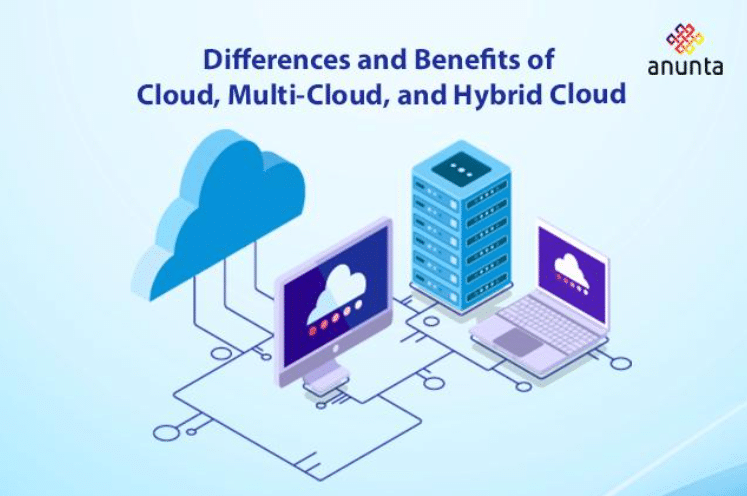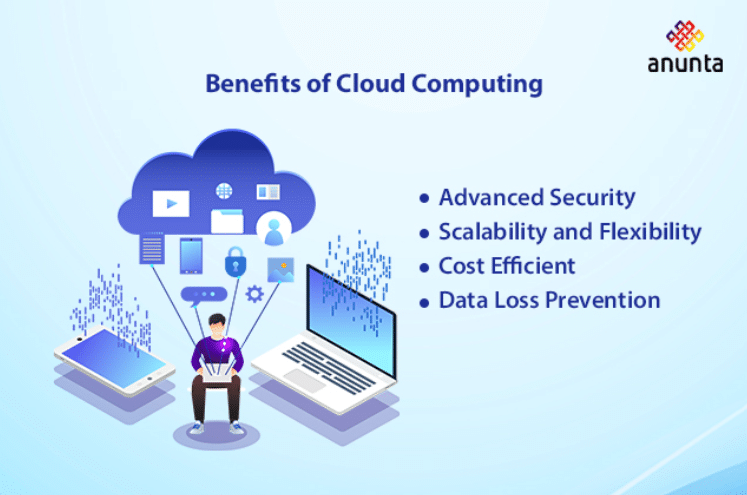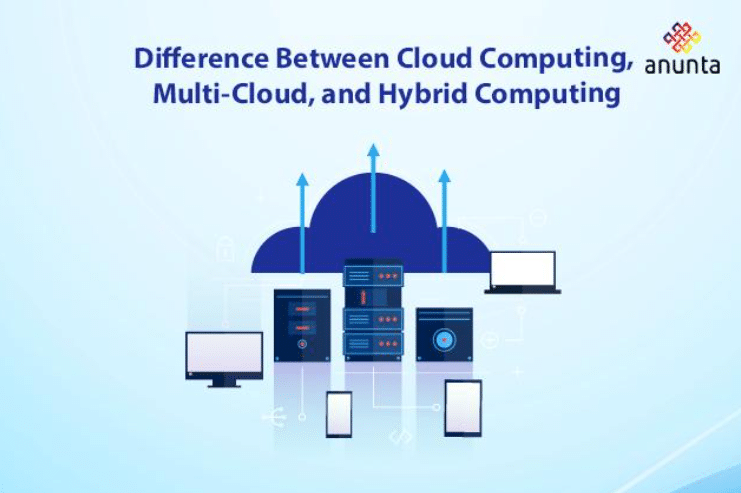
Businesses now have a new avenue to become more inventive, flexible, and successful with Cloud computing and Cloud Migration. This transition of businesses from conventional to cloud, along with the benefits of cloud for team collaboration and communication.
There are a lot of cloud computing systems that ensure that the infrastructure is strong and secure for the companies. There are multi-cloud ecosystems and hybrid cloud ecosystems that also serve the best services for companies. It is important to know before cloud migration which cloud ecosystem will be beneficial for the company and which infrastructure you must rely on. This blog post analyzes each of the cloud computing models in detail so it can help you in selecting the best cloud ecosystem for growing your business.
Cloud computing is a term that is used to describe the delivery of on-demand computing resources such as software, hardware, networking, databases, and storage to businesses through a network. It allows companies and individuals to access and store their data and information without managing their physical infrastructure.
The amount of data is increasing day by day, and there is more demand from consumers to have online services. In this situation, it isn’t easy to store and access the data physically; thus, businesses are moving to cloud computing, making it easier for them to store and access the data and provide online services to consumers.
Cloud computing is managed by a third-party service provider, which allows companies to access IT services without paying upfront for infrastructure services.
Cloud computing provides enhanced efficiency and accessibility, allowing businesses to leverage remote servers for data storage and application hosting, which supports seamless collaboration and reduces the need for physical infrastructure.

Cloud computing can strengthen your security posture as it involves various types of security features with centralized management and automatic maintenance of the ecosystem, which is challenging to breach. There are top security providers that employ the most advanced solutions to provide robust solutions to clients.
Cloud computing provides more flexibility to the business. There is quick scaling of resources and storage to meet the business demands without the requirement of investing in the physical infrastructure. There is no need for the companies to pay for the infrastructure, and they can scale down if the resources are not used. Thus, it is one of the significant benefits of cloud computing.
If the business has in-house infrastructure to store the data, then they have to pay upfront for it. However, cloud computing involves a model in which the companies have to pay only for the resources they are using. This helps them to avoid overbuilding and overprovisioning the data center.
There is a backup offer before the cloud migration, and disaster recovery features are available. If you are storing data in the cloud rather than locally, then it will help you to prevent data loss in the event of an emergency such as malicious threats, hardware malfunction, or any other simple error.
Multi-cloud and hybrid cloud are ecosystems that involve more than one deployment model. A multi-cloud involves a similar type of cloud infrastructure. An enterprise uses the combination of two or more public cloud services. However, there would not be a mixture of private and public cloud; there would be collaboration of similar public cloud services.
The multi-cloud ecosystem enables organizations to strategically utilize various cloud services, optimizing performance, ensuring better reliability, and enhancing innovation through diverse technology solutions.
It reduces the risk of vendor lock-in as there is less dependency on a single cloud provider. It enhances the flexibility and negotiation power of the organization. This system helps build a multi-cloud environment very fast. You are not tied to a single provider, and therefore, you can choose the solution that best suits your business needs. This feature helps in reducing the dependability of one company for costs.
Multi-cloud helps you choose from various cloud services so that you can choose the best resources from multiple clouds. There is flexibility in matching specific features and capabilities to optimize the workload in the enterprise. It provides benefits from various cloud services such as speed, performance, reliability, geographical location, compliance requirements, and security.
Multi-cloud provides the best opportunity to minimize the spending on resources. This is because the public cloud comes with less overhead, and it allows businesses to scale up or down the services as per their requirements. This will help the organization reduce spending and spend only on those services that are required for the business.
Multi-cloud reduces unplanned downtime and outages as it reduces the risk of single-point failure. Therefore, there would be less redundancy, which would impact the services in other clouds. If the cloud does go down, then the data will be routed to another cloud without any redundancy.
A hybrid cloud ecosystem blends two different types of cloud, which will be either public or private cloud. It combines on-premises infrastructure or private cloud with public cloud services that enable data and application portability between them. This hybrid model provides a cohesive and flexible environment that can adapt to varying workloads and business demands.
When there is cloud migration into a hybrid cloud, the main objective is to develop a unified space where separate systems interact, manage, and communicate in the same IT workloads.
A hybrid cloud ecosystem combines the advantages of public and private clouds, offering greater flexibility, scalability, and cost-efficiency while ensuring data security and compliance. This approach allows businesses to optimize their IT infrastructure, manage workloads more effectively, and respond swiftly to changing demands.
The main obstacle that any company faced with a private expense was that they were supposed to wait for significant funds to expand, maintain, and establish their infrastructure, but with a hybrid cloud ecosystem, it is easier to add computational power and run more complex features by using a hybrid setup.
If there is a hybrid cloud infrastructure, then the organization can take advantage of the security features that come with a private cloud and the power and options of the public cloud. There is cloud migration from private to public cloud for data to be used by applications, analytics systems, and other processes. This hybrid cloud environment is based on encryption methods to ensure that the data is safe throughout the process.
In the long run, hybrid cloud computing reduces costs. Businesses might save money throughout this procedure because it is less costly. Furthermore, there’s a good prospect of scalability, which means businesses may make more money and save more with it. As with multi-cloud systems, hybrid cloud computing also helps you save money when migrating your data from one cloud provider to another.
Hybrid cloud computing is quicker than multi-cloud computing and optimizes the network in ways that reduce latency and simplify the data transfer process. It uses the power of edge computing that makes the entire IT infrastructure faster in a hybrid cloud ecosystem.

| Features | Cloud Computing | Multi-Computing | Hybrid Computing |
| Infrastructure | Hosted by a single provider | Services from multiple service providers of the same system | There is a combination of on-premises and public cloud |
| Security | There are advanced security measures by providers | The security varies by provider capabilities | There is high security with control over sensitive data |
| Compliance | There are specific compliance solutions | It involves complex management with provider-specific and other compliances | It makes compliance with critical data on-premises easier. |
| Vendor Dependency | High | Low | Low to Medium |
| Data Control | Provider will control data management | The data control is distributed across multiple providers | There is high control in hybrid computing with sensitive data being on-premises |
| Latency | Depends on the provider’s infrastructure | There is optimization by provider’s choice | Low latency for on-premises. However, it varies depending on the cloud service provider. |
Businesses have a range of options when navigating the complicated world of cloud computing. It is imperative for businesses to verify the distinct attributes of every model prior to migrating to the cloud. Since, it comes with its share of difficulties, it is best to examine the models and assess the unique needs of the companies, as well as the regulatory environments and long-term objectives, in order to choose the best cloud strategy for the company.
Q: What is the main difference between cloud and multi-cloud?
A: The main difference lies in the number of cloud providers. In cloud computing, there is a single provider, whereas in multi-cloud, multiple cloud providers are involved.
Q: What is the typical use case of hybrid cloud computing?
A: Hybrid cloud computing is generally used by companies that want to maintain data on-premises due to regulatory frameworks and reduce latency for critical applications. So, in this case, they leverage benefits from both private and public cloud computing.
Q: Can small businesses benefit from hybrid cloud computing?
A: Yes, small businesses can benefit from hybrid cloud computing as there are some specific regulatory frameworks that they need to follow by keeping the critical data on-premises while at the same time leveraging the scalability of the business through public cloud services.
Q: How do companies manage multi-cloud strategy?
A: Organizations manage multi-cloud environments through cloud management platforms that provide a unified interface to oversee the resources, automate the processes, and ensure security and compliance for all cloud providers.
Q: What are the trends and future developments in cloud computing?
A: There is increased adoption of AI and machine learning services, with the expansion of serverless computing models, edge computing, and various such services becoming the future of cloud computing.